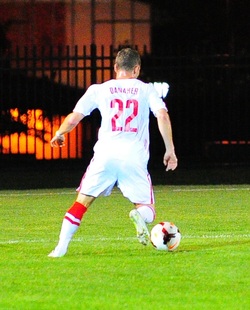|
Matt Danaher is a Soccer player + Coach (And founder of SoccerSpotlight.org) who is filled with wisdom and incredible soccer sense. I'm excited to be sharing his awesome posts! Enjoy. -z  My inspiration for this blog comes from reading an article written by the brother of a former teammate of mine, Tim West. His brother, Nick West, wrote an article that talked about the book Stumbling on Happiness by Daniel Gilbert. “Human beings come into the world with a passion for control. And research shows that if humans lose their ability to control at any point between their entrance and their exit, they become unhappy, helpless, hopeless, and depressed…and occasionally dead…” Immediately this had my attention, but there’s more. “Researchers arranged for student volunteers to pay regular visits to nursing home residents. Residents in the high control group were allowed to control the time and duration of the student’s visit, and residents in the low control group were not. After two months, residents in the high control group were happier, healthier, more active, and taking fewer medications than those in the low control group. At this point, the researchers concluded their study and discontinued the student’s visits. Several months later, a disproportionate amount of residents that had been in the high control group had died. Only in retrospect did the cause of this tragedy seem clear. The residents who had been given control, and who had benefited from that control when they had it, had been inadvertently robbed of control when the study ended. Apparently, gaining control can benefit one’s health and well-being, but losing control can be worse than having never had any at all.” "...YOU control your development as a player. YOU control your attitude and confidence, and YOU will amaze yourself ... when your chance finally comes..."With this in mind, I wondered, “Why can a player go from being really happy and playing well, to unhappy and wanting to leave their current club or school?” The first answer that came to mind was “Well, maybe they aren’t playing as much as they think they deserve, and that is making them unhappy.” This is far too simplistic of an answer. I pondered this further, and came to the conclusion that the real reason why people who are relegated to the bench become upset is because they feel like they have lost control. They feel that no matter what they do, it won’t change their coach’s opinion of them, and they begin to lose hope and belief in themselves as both a player and a person. They want to take back control, so they decide to leave the team or quit playing entirely. I made the decision early on this summer that my goal for the fall season with Fairfield University would not be to get into the starting 11. Yes, it would be nice to play a lot my senior year, and I am still just as passionate about the game now as I’ve ever been, possibly even more so. But I have learned that it is time for me to stop using starts and minutes played as the measuring stick for how good of a footballer I have become. If I did, and I only played 20 minutes a game this season, that would mean I have regressed as a player, which couldn’t be further from the truth. I’ve played in the first division in Ireland for 5 months, over 700 minutes in the PDL this summer, and I’ve watched my technique, anticipation, and confidence all improve dramatically. The control of my game does not rest in my manager’s hands; it rests with me. I am always in control. If I am improving and doing extra on my own, then my reward will be seeing myself improve as a player. Maybe this will help me get into the starting 11, maybe it won’t. But ultimately I derive my satisfaction from the improvement I see everyday in training, not if it means I find my name on the team sheet. Your goal should be to be better today than you were yesterday; to train because you enjoy it, not because it’s going to get you into the match on Saturday night. When seen in this light, YOU control your development as a player. YOU control your attitude and confidence, and YOU will amaze yourself with how much less pressure you will play with when your chance finally comes.
Ask the manager and assistant coaches what you need to improve on, and get working on it. Don’t see being on the bench as a problem; instead, see it as a challenge. If you don’t play in a match, don’t panic! Do some running after the match to keep your fitness level up and while the teams rests on their day off, work on what you need to improve as a player. Show up to training 30 minutes early, stay 30 minutes later. Find a teammate who is willing to do it with you. It will make it easier to stay positive and soon you will do extra without really thinking your doing extra; a positive habit. By taking these steps, you’ll be creating freedom for yourself, as both a player and a person. And with freedom, comes control. Never let anyone take your freedom away from you.
1 Comment
David
11/15/2015 06:02:02 am
Im impressed by the positive minds you guys have. I'll work in it myself.
Reply
Leave a Reply. |
Zak DrakeI love helping players optimize their soccer careers + lives through actualizing their potential. Categories
All
Archives
June 2018
|

 RSS Feed
RSS Feed